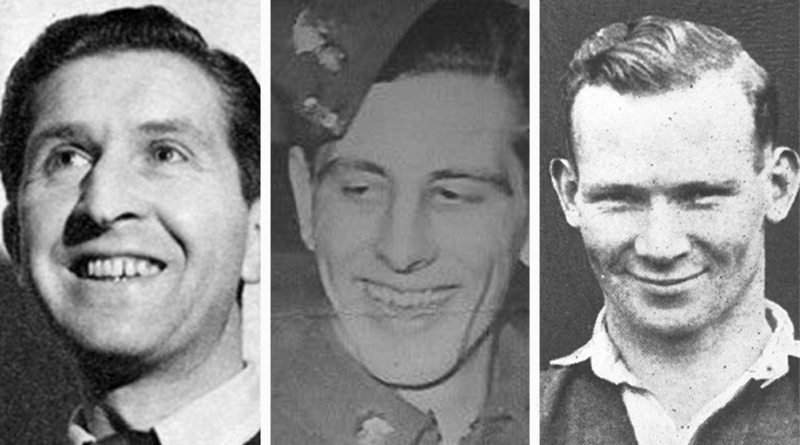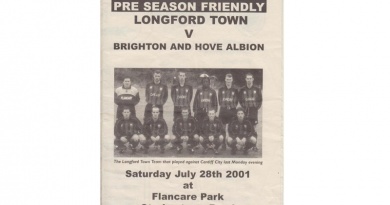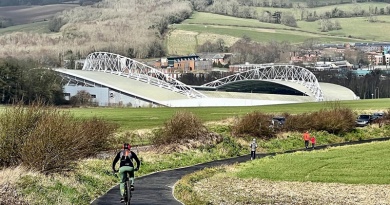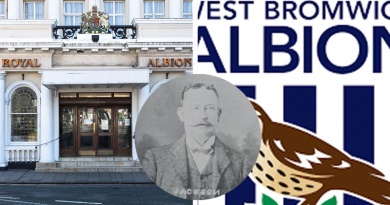The stories of 7 Brighton & Hove Albion players who served in World War II
As World War II raged for six long and bloody years, many Brighton & Hove Albion footballers turned from stars of the Goldstone Ground to real heroes.
Football continued throughout the war of course. Giving the public matches every weekend to keep them entertained was considered good for morale, even if results were erratic and player turnover high as young men were moved around the country as part of the war effort.
One week, a player could be turning out for Brighton and the next he could be behind enemy lines in France. Football was a sideshow really compared to what was happening on the continent, in North Africa, the Middle East and Asia.
Between 1939 and 1945, players from the Albion saw action in every corner of the globe where war was being waged. Here are just seven of the stories of the heroes from Brighton & Hove Albion who fought for freedom in World War II.
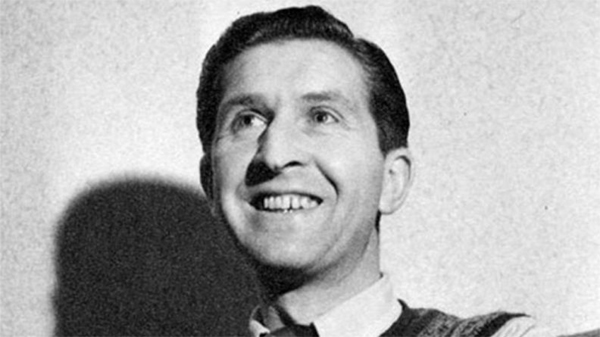
Stan Morgan
Stan Morgan was a young amateur with Arsenal when World War II began. Following the outbreak of hostilities, the Gunners encouraged all their young players to sign up for the forces.
By the time he signed his first professional contract at Highbury in 1941, he was a Corporal in the 11th Battalion Royal Fusiliers having originally joined the 2nd/8th (1st City of London) Battalion Royal Fusiliers as a Private in 1939.
Morgan spent two years of World War II playing for Brighton & Hove Albion thanks to the guest player system. This enabled players stationed in a particular district to make up the numbers for a local club, having first received the permission of their commanding officer.
Charlie Webb gave Morgan his Brighton debut on November 15th 1941 in a 2-2 draw at home to Watford. He was pretty much a regular for the next 12 weeks right up until the end of February, when Morgan and his fellow Arsenal-turned-Albion teammate Cyril Tooze missed three matches.
The reason for their absence? On February 27th 1942, Morgan and Tooze were taking part in a daring mission behind enemy lines in France.
Chief of Combined Operations, Admiral Lord Mountbatten, had proposed a raid against a radar station at Bruneval, near Le Havre.
The ‘C’ Company 2nd Parachute Battalion under the command of Major J.D Frost were to be dropped at night by the RAF, with the aim being to capture and hold the station while the radar was dismantled and its parts brought safely to a nearby beach for a dawn evacuation by the Royal Navy.
Morgan and Tooze were both part of the sea rescue, manning the guns of the landing craft which retrieved Major Frost, the parachutists, the radar and two German radar technicians from right under the noses of a German naval patrol operating nearby.
At a time when the war wasn’t going particularly well, the Bruneval Raid gave the nation a morale boosting success. It also helped reaffirm Winston Churchill’s belief in the future of airborne forces at a time when critics were openly questioning the Prime Minister’s approach.
Morgan and Tooze received a rapturous reception on their next appearance for the Albion, a 0-0 draw against Millwall just one week after they’d been on a boat out on the English Channel.
14 days after his heroics on the French coast, Morgan was scoring his seventh goal of the season in a 4-2 defeat away for Brighton against his own club, Arsenal.
Morgan went onto see action in Italy, Southern France and Palestine. He didn’t play for Brighton & Hove Albion again after World War II, instead returning to Arsenal with whom he won the English championship in 1948.
He went onto play for Walsall, Millwall and Leyton Orient and ended up with a peacetime record of 46 goals from 264 games before his retirement in 1956, working as a representative for Kenwood before his death in London in 1971.
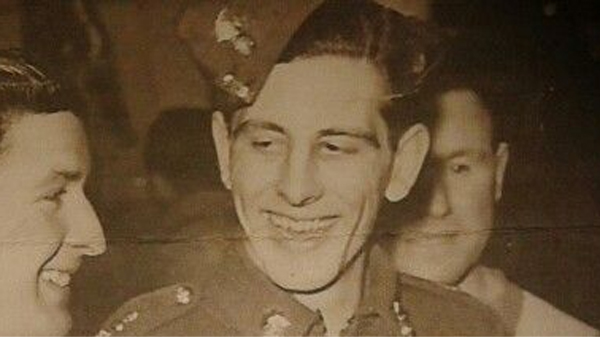
Cyril Tooze
Just like Morgan, Tooze was a Welsh war hero who guested for Brighton from Arsenal. He made 17 appearances for the Albion between 1941 and 1942 and his efforts alongside Morgan as part of that raid in France in February 1942 earned him the greatest respect from the Goldstone crowd.
That was the only start of his war efforts. After playing nine times as a guest player for Heart of Midlothian in the 1942-43 season, Tooze and the 9th Battalion Royal Fusiliers (City of London Regiment) were sent overseas to fight in the final stages of the Tunisia Campaign.
Tooze and another Arsenal teammate, goalkeeper Ted Platt, were taken as prisoners of war in North Africa by the Axis Powers. When the Eighth Army entered Tunis, both were released and would go onto take part in the Allied Invasion of Italy in September 1943.
The 9th Battalion were involved in the Italian landings at Salerno and fought their way across the Volturno Line, before being held up at the Winter Line in December.
Tragically, Tooze made the ultimate sacrifice when he was killed by a bullet from a German sniper during the Battle of Monte Cassino on January 22nd 1944. He is buried at Minturno War Cemetery some 50 miles north of Naples.
Bill Isaac
Bill Isaac was the other Brighton & Hove Albion player who lost his life during World War II. Isaac arrived at the Goldstone from Newcastle United in the summer of 1939 and he started all three of the Albion’s opening games of the 1939-40 campaign against Port Vale, Aldershot and Bristol City.
Division Three South was then suspended, replaced by the first Football League South War League. Isaac scored in Brighton’s first fixture in the new competition, a 4-0 home win over Aldershot.
That was the be the last time he was seen at the Goldstone that season as he was shipped to the continent with the Territorials, which included being evacuated from Dunkirk.
Issac went onto play 10 times for the Albion in the 1940-41 season, scoring twice to take his career totals onto three goal in 12 games.
He sadly contracted meningitis as a result of his war efforts and died on Easter Monday 1941, just two months after his final game in a Brighton shirt, a 3-1 defeat to Arsenal.
Bishek Szajna-Stankowski
Polish goalkeeper and pilot Bishek Szajana-Stankowski played two games at the Goldstone during World War II – one as part of an RAF Representative team and one in a Brighton & Hove Albion shirt.
In that first game, one of a number of challenge matches that took place between the divisions of the Armed Forces during the war, he was simply listed on the team sheet as A.Pole.
There were fears of reprisals towards his family back home in Poland should the Germans gain knowledge of his wartime activities flying planes for the RAF.
Szajana-Stankowski’s one appearance for the Albion came on the opening day of the 1943-44 season, a 4-0 defeat at home to Reading. He went onto play once for Peteborough United in the 1945-46 season.
Little seems to be known about Szajana-Stankowski’s war record – other than he was he an airman – or what happened to him after the conflict ended.
Lots of RAF bases around Sussex were home to Polish pilots and ground crew during World War II and as a result, Szajana-Stankowski wasn’t the only Pole to have played for Brighton & Hove Albion.
A year earlier, Felix Bojar became the first foreign player in Albion history when he played 10 games in the 1942-43 campaign while serving as a corporal with the Polish Air Force.
Bojar had previously been a full back of some distinction in his home country, including representing Poland at international level. Those who saw him described him as a brilliant, two-footed player with great ball control.
Such were Bojar’s talents that Webb used him as both a defender and an attacker and he even helped coach the Albion’s youth team during his brief time in Sussex.
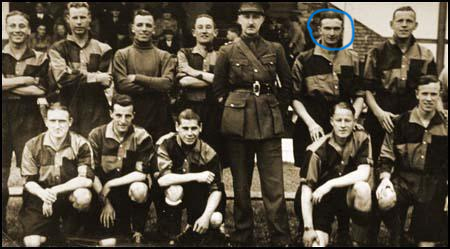
Billy Ithell
Billy Ithell guested for Brighton & Hove Albion on two occasions during World War II. His debut was certainly memorable, coming as it did in the Albion’s 18-0 defeat against Norwich City on Christmas Day 1940.
At the outbreak of war, 17 Bolton Wanderers players including Ithell joined the 53rd (Bolton) Field Regiment – they are pictured above with Ithell circled.
The Regiment found itself stationed in Norwich in 1940 and so its members made many guest appearances for the Canaries, four of them turning out in yellow for the hammering of Brighton.
Ithell had been set to watch from the Carrow Road stands that day but when Webb and Brighton turned up with only four players, stewards began asking for volunteers from the crowd to make up the numbers.
Ithell found himself taking up the thankless task, playing 90 minutes at centre half and scoring an own goal for good measure.
Prior to taking part in that record-breaking Christmas Day defeat, Ithell and the Bolton Regiment had been sent to France in an attempt to curb the German advance.
While on the continent, the Regiment came under sustained attack from the advancing Panzer divisions. Bolton’s captain Harry Goslin was credited with destroying four enemy tanks as the Regiment were pushed back, eventually being rescued at Dunirk.
The Bolton Regiment would go onto fight in Egypt at El Alamein in 1942 and took part in the invasion of Italy in September 1943.
Goslin lost his life in Italy when he was mortally wounded by shrapnel and wood to the back a month before Tooze was killed in the same campaign.
Ithell was lucky enough to make it home. He made his second Brighton appearance in the 1943-44 season as the Albion lost 2-0 at home to Tottenham Hotspur – a 16 goal improvement on that first game at Norwich three years earlier.
The war meant that Ithell never had the chance to play a competitive game for Bolton. After also guesting for Chester City, Mansfield Town and Reading, he played 107 times for Swindon Town in Division Three South before becoming Boston United manager.
Johnny Wallis
At the outbreak of war, Johnny Wallis was a seriously talented young footballer. He had captained London and represented England at schoolboy level and been signed by his beloved Tottenham as an amateur at the age of 14, joining the ground staff when he left school in 1938 while turning out for the reserves and junior sides at White Hart Lane.
Wallis made his Spurs debut in November 1940 at the age of 18, making nine appearances in-between duty with the Royal Artillery in Burma and Malaya.
He guested for Enfield in the early part of World War II before playing three games for Brighton & Hove Albion in the 1944-45 season.
Soon after making his third and final appearance in the stripes, he was sent to Palestine with the Royal Artillery. It was while serving in the Middle East that he suffered severe shrapnel injuries which ended his promising footballing career before it had even begun.
Initially, Wallis attempted to battle through the problems. The pain he was in however meant it was impossible for him to train properly. His weight fluctuated as a result and he had no choice but to retire once the Football League resumed following the end of the war.
Wallis remained in the sport and with Tottenham for the next 50 years. He coached Spurs’ reserve team, worked with the first team as a trainer, physio and kit man before going full circle and retiring as a groundsman in 1994. He received an MBE in the 1993 Queen’s Birthday Honours List and passed away 10 years later.
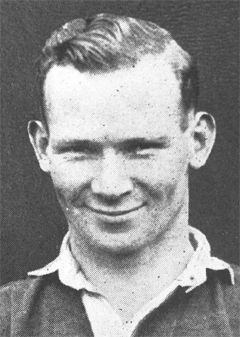
Alex Munro
Scottish international Alex Munro joined Blackpool from Hearts in 1937 for £3,500 and was a regular fixture in the Seasiders’ lineup right up until the outbreak of war.
He guested for Middlesbrough in the 1940-41 season before being sent into action. There are conflicting stories about where Munro served; some sources suggest he was sent to the Middle East while others say he was in North Africa.
What we do know is that in 1942 he was reported as missing. After two long months without any news, it transpired that Munro had been captured by the Germans and was now in a prisoner of war camp in Italy. He spent three years as a POW.
Not only did Munro survive that experience, but once football resumed he went onto make it to the 1948 FA Cup with Blackpool.
Munro was forced into a new position in the lead up to the final, switching from his favoured right flank to the left. Still, if you’re going to make way for anyone, then Sir Stanley Matthews isn’t a bad player to move over for.
Unfortunately, Matthews, Munro and Blackpool lost the final 4-2 at Wembley in front of 99,842 as Sir Matt Busby lifted his first trophy as Manchester United manager.
Munro retired from playing in 1950 after 136 games for Blackpool, a total that obviously would have been considerably more were it not for the war. He remained at Bloomfield Road as a coach and then a scout.

